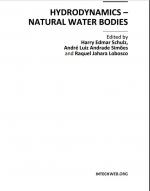Добрый день, Коллеги. Важное сообщение, просьба принять участие. Музей Ферсмана ищет помощь для реставрационных работ в помещении. Подробности по ссылке
Hydrodynamics - Natural Water Bodies
Hydrodynamics is a very rich area of study, involving some of the most intriguing theoretical problems, considering our present level of knowledge. General nonlinear solutions, closed statistical equations, explanation of sudden changes, for example, are wanted in different areas of research, being also matter of study in Hydromechanics. Further, any solution in this field depends on many factors, or many “boundary conditions”. The changing of the boundary conditions is one of the ways through which the human being affects its fluidic environment. Changes in a specific site can impose catastrophic consequences in a whole region. For example, the permanent leakage of petroleum in one point in the ocean may affect the life along the entire region covered by the marine currents that transport this oil. Gases or liquids, the changes in the quality of the fluids in which we live certainly affect our quality of life. The knowledge about fluids, their movements, and their ability to transport physical properties and compounds is thus recognized as important for life. As a consequence, thinking about new solutions for general or specific problems in Hydromechanics may help to attain a sustainable relationship with our environment
Contents:
Preface
Part 1 Tidal and Wave Dynamics: Rivers, Lakes and Reservoirs
Chapter 1 A Hydroinformatic Tool for Sustainable Estuarine Management
Chapter 2 Hydrodynamic Control of Plankton Spatial and Temporal Heterogeneity in Subtropical Shallow Lakes
Chapter 3 A Study Case of Hydrodynamics and Water Quality Modelling: Coatzacoalcos River, Mexico
Chapter 4 Challenges and Solutions for Hydrodynamic and Water Quality in Rivers in the Amazon Basin
Chapter 5 Hydrodynamic Pressure Evaluation of Reservoir Subjected to Ground Excitation Based on SBFEM
Part 2 Tidal and Wave Dynamics: Seas and Oceans
Chapter 6 Numerical Modeling of the Ocean Circulation: From Process Studies to Operational Forecasting – The Mediterranean Example
Chapter 7 Freshwater Dispersion Plume in the Sea: Dynamic Description and Case Study
Part 3 Tidal and Wave Dynamics: Estuaries and Bays
Chapter 8 The Hydrodynamic Modelling of Reefal Bays – Placing Coral Reefs at the Center of Bay Circulation
Chapter 9 Astronomical Tide and Typhoon-Induced Storm Surge in Hangzhou Bay, China
Chapter 10 Experimental Investigation on Motions of Immersing Tunnel Element under Irregular Wave Actions
Chapter 11 Formation and Evolution of Wetland and Landform in the Yangtze River Estuary Over the Past 50 Years Based on Digitized Sea Maps and Multi-Temporal Satellite Images
Part 4 Multiphase Phenomena: Air-Water Flows and Sediments
Chapter 12 Stepped Spillways: Theoretical, Experimental and Numerical Studies
Chapter 13 Sediment Gravity Flows: Study Based on Experimental Simulations




